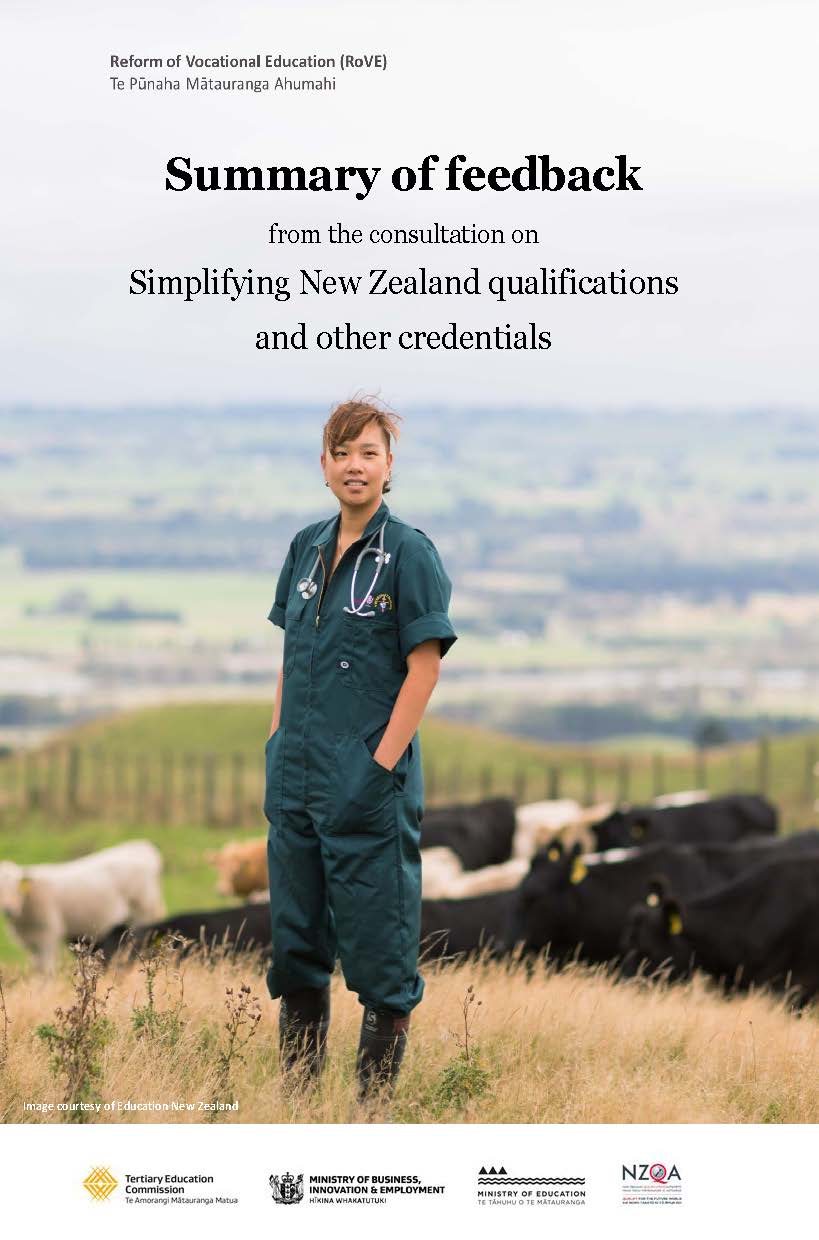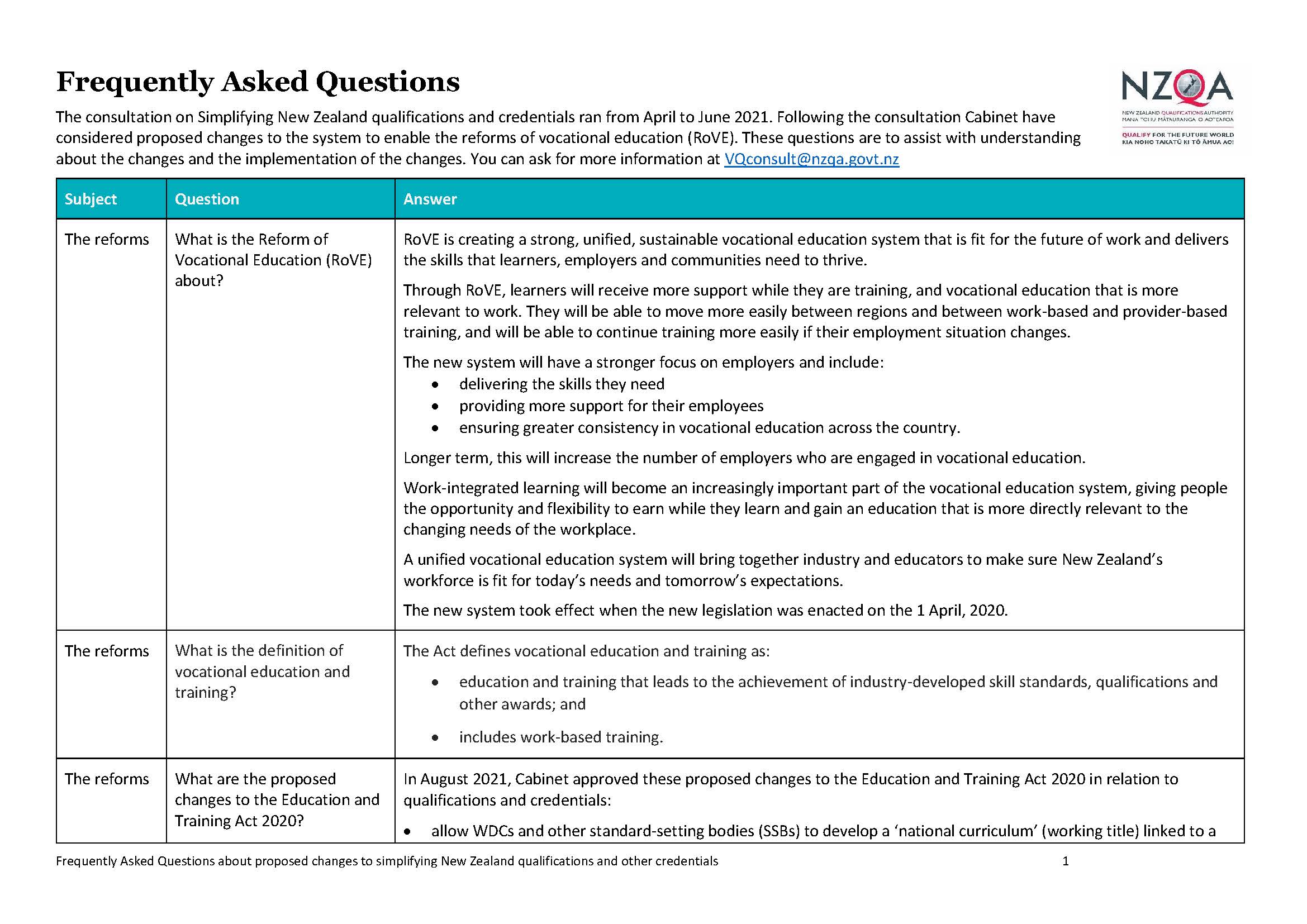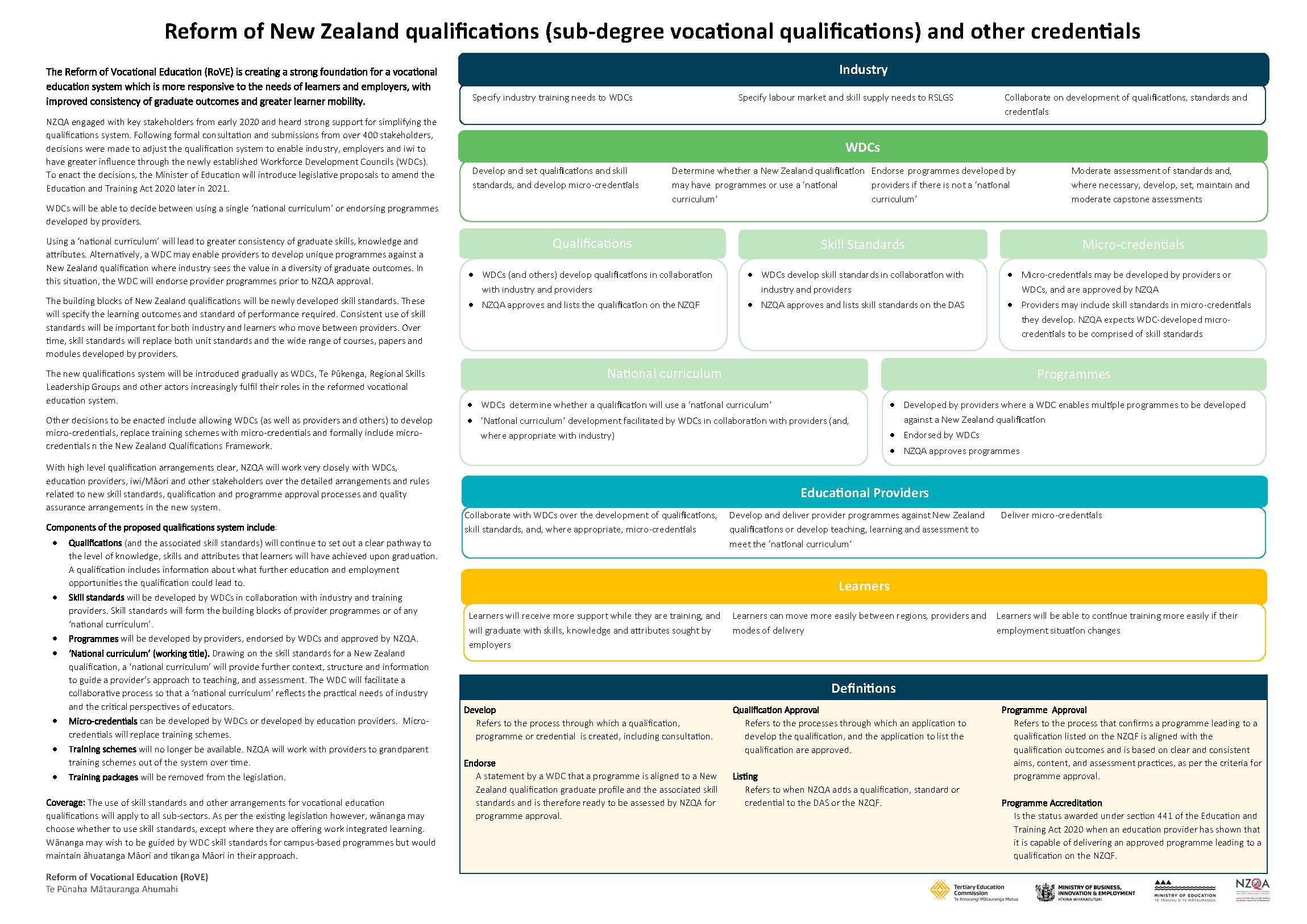RoVE UPDATE
the changing face of education
The latest updates
This week there have been several communiques from NZQA
Released by the RoVE Team September 15
Today we have announced the way forward for the reform of vocational education qualifications and credentials.
Earlier this year NZQA consulted with iwi, Māori and other stakeholders on proposals to simplify New Zealand’s qualifications and other credentials. During this consultation we heard from over 400 stakeholders, and the Government has made a number of decisions that will be included in future updates to The Education and Training Act 2020.
The key decisions include allowing WDCs (as well as providers) to develop micro-credentials, replacing Training Schemes with micro-credentials, and formally including micro-credentials on the New Zealand Qualifications Framework.
In addition, WDCs will have the option of allowing multiple provider programmes to be developed against a New Zealand Qualification or to lead the development of a ‘national curriculum’ alongside providers. WDC-developed skills standards will become the building blocks for all provider delivery.
RoVE aims to significantly increase industry, employer and iwi influence over vocational education. Highly effective collaboration across industry, iwi, WDCs, providers and government agencies will be required in this new system. New skills standards and ‘national curriculum’ (where one is used), for example, will need to be collaboratively developed to ensure that industry imperatives and education perspectives are both valued.
This new system will be introduced gradually as WDCs, Te Pūkenga, Regional Skills Leadership Groups and other actors fully stand up and develop some of the new capabilities they will require to discharge their roles in the reformed vocational education system.
With high level qualification arrangements clear, NZQA will work very closely with WDCs, education providers, iwi / Māori and other stakeholders over the detailed arrangements and rules related to new skills standards, qualification and programme approval processes and quality assurance arrangements in the new system.
The summary of consultation feedback, detailed information about the reforms is now available on the NZQA website: http://VQconsult.nzqa.govt.nz
In addition to this, NZQA will be hosting two information sessions on the decisions made and provide an opportunity for you to ask any questions you may have about the way forward. Please register here.
Finally, if you have any other questions about these reforms please contact VQconsult@nzqa.govt.nz.
RoVE Release September 14
The simplification of qualifications and other credentials
Thank you for your engagement with the New Zealand Qualifications Authority’s (NZQA) consultation on the simplification of vocational qualifications and other credentials.
The consultation focused on three specific areas:
- Whether or not to move away from multiple programmes leading to each New Zealand qualification by using a ‘national curriculum’ approach
- Whether or not to replace training schemes with micro-credentials
- Whether or not to enable Workforce Development Councils to develop micro-credentials.
We heard from 428 parties about the three proposals. Please see a summary of the feedback at http://VQconsult.nzqa.govt.nz. The information received was further tested in two workshops with more than 120 participants after the close of consultation.
Based on the feedback and subsequent information, NZQA and the Ministry of Education put up an additional option to the Minister of Education in relation to the ‘national curriculum’ idea. That option was to provide WDCs with the ability to decide – qualification by qualification – whether to enable multiple programmes against the New Zealand qualification or to use a ‘national curriculum’. This variation of Option 1B was ultimately the option agreed upon by Cabinet.
This will ensure that where a WDC - on behalf of industry - sees value in more diversity of provision, they are able to approve the development of multiple provider programmes against the New Zealand Qualification. In these cases, WDCs will endorse provider’s programmes before NZQA considers the programme for approval.
Conversely, in fields of study where a higher degree of consistency of graduate skills, knowledge and attributes is required, it is anticipated that WDCs will agree – alongside providers – a ‘national curriculum’. Providers will teach to this ‘national curriculum’ rather than develop a unique programme of study. Where a ‘national curriculum’ is used this will enable students to move more readily between providers, regions, and modes of delivery.
In either case, new skills standards that draw on the best of programmes of industry training and learning outcome programmes will be the building blocks for providers’ delivery of New Zealand qualifications. NZQA will now work closely with all relevant stakeholders to develop the detail of new skills standards and the parameters of how a ‘national curriculum’ approach could operate.
Cabinet has also agreed to the replacement of training schemes with micro-credentials, and to enable WDCs and others to develop micro-credentials for providers to deliver. NZQA will work closely with providers that currently offer Training Schemes to ensure that a grandparenting approach is used to avoid unnecessary disruption.
The attached A3 provides information about the high-level qualification arrangements under RoVE. As the attached document emphasises, effective collaboration between industry, iwi, WDCs, providers and government agencies will be critical to the new system. The shift to a significantly more end-user influenced system will work best where there are regular and meaningful opportunities for industry and education perspectives to be integrated into qualification design, skills standards design and ‘national curriculum’.
The decisions communicated today elaborate or clarify the high-level intent of RoVE in relation to qualification arrangements. NZQA looks forward to working closely with WDCs, iwi / Māori, providers and other stakeholders over the skills standards, qualification and programme approval rules, and quality assurance arrangements under RoVE. Much of this detail will be co-created with stakeholders.
With these decisions, we are one step closer to creating the foundations for a national vocational education system that better meets the needs of industry and iwi, while preparing students for the fast-changing future of skills, learning and work.
We will be hosting two information sessions on the decisions made and provide an opportunity for you to ask any questions you may have about the way forward. Please register here.
If you have any further questions about these changes, please contact us through our email VQconsult@nzqa.govt.nz
More RoVE document releases below
SIGN UP TODAY:
How to Get the Latest Stories Hot off the Press
AECTP is the Industry Peak Body and is working to keep you informed of the many changes going on in our world.



